2006高考英语试题(全国卷3)
(完整word版)2006高考英语试题(全国卷3)
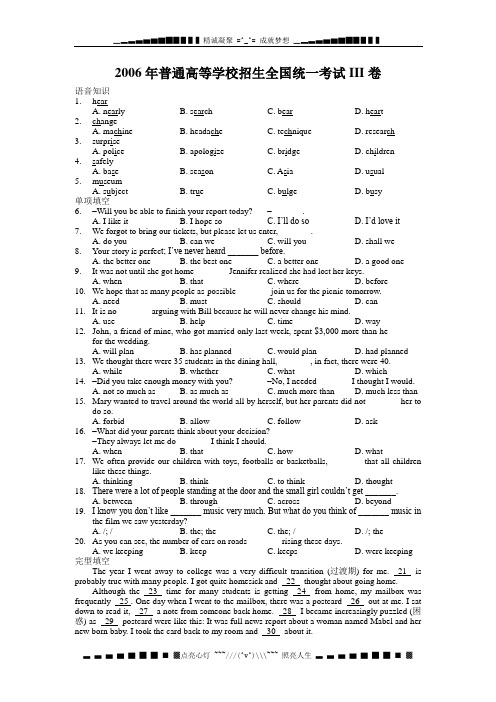
2006年普通高等学校招生全国统一考试III卷语音知识1.hearA. nearlyB. searchC. bearD. heart2.changeA. machineB. headacheC. techniqueD. research3.surpriseA. policeB. apologizeC. bridgeD. children4.safelyA. baseB. seasonC. AsiaD. usual5.museumA. subjectB. trueC. bulgeD. busy单项填空6.–Will you be able to finish your report today? –_______.A. I like itB. I hope soC. I’ll do soD. I’d love it7.We forgot to bring our tickets, but please let us enter, _______.A. do youB. can weC. will youD. shall we8.Your story is perfec t; I’ve never heard _______ before.A. the better oneB. the best oneC. a better oneD. a good one9.It was not until she got home _______ Jennifer realized she had lost her keys.A. whenB. thatC. whereD. before10.We hope that as many people as-possible _______ join us for the picnic tomorrow.A. needB. mustC. shouldD. can11.It is no _______ arguing with Bill because he will never change his mind.A. useB. helpC. timeD. way12.John, a friend of mine, who got married only last week, spent $3,000 more than he _______for the wedding.A. will planB. has plannedC. would planD. had planned13.We thought there were 35 students in the dining hall, _______, in fact, there were 40.A. whileB. whetherC. whatD. which14.–Did you take enough money with you? –No, I needed _______ I thought I would.A. not so much asB. as much asC. much more thanD. much less than15.Mary wanted to travel around the world all by herself, but her parents did not _______ her todo so.A. forbidB. allowC. followD. ask16.–What did your parents think about your decision?–They always let me do _______ I think I should.A. whenB. thatC. howD. what17.We often provide our children with toys, footballs or basketballs, _______ that all childrenlike these things.A. thinkingB. thinkC. to thinkD. thought18.There were a lot of people standing at the door and the small girl couldn’t get _______.A. betweenB. throughC. acrossD. beyond19.I know you don’t like _______ music very much. But what do you think of _______ music inthe film we saw yesterday?A. /; /B. the; theC. the; /D. /; the20.As you can see, the number of cars on roads _______ rising these days.A. we keepingB. keepC. keepsD. were keeping 完型填空The year I went away to college was a very difficult transition (过渡期) for me. 21 is probably true with many people. I got quite homesick and 22 thought about going home.Although the 23 time for many students is getting 24 from home, my mailbox was frequently 25 . One day when I went to the mailbox, there was a postcard 26 out at me. I sat down to read it, 27 a note from someone back home. 28 I became increasingly puzzled (困惑) as 29 postcard were like this: It was full news report about a woman named Mabel and her new born baby. I took the card back to my room and 30 about it.Several days later I 31 another postcard, this one 32 news about Maybelline, Mabel’s cousin. Soon after, another card arrived and then another, 33 full of different people. I began to 34 look forward to the next one, 35 to see what this author would come up with 36 . I was never 37 .Finally, the cards 38 coming, right about the time I had begun to feel 39 about college life. They had been such a happy distraction (调剂) that, I have 40 all the postcards and still bring them out to read whenever I need a life.21. A. If B. So C. As D. What22. A. often B. carefully C. seldom D. merely23. A. hard B. last C. busiest D. happiest24. A. visitors B. letters C. calls D. directions25. A. empty B. full C. closed D. open26. A. pouring B. reaching C. staring D. rolling27. A. describing B. considering C. enjoying D. expecting28. A. But B. Thus C. Also D. Even29. A. any B. no C. some D. such30. A. joked B. talked C. forgot D. cared31. A. mailed B. accepted C. wrote D. received32. A. delivering B. demanding C. discovering D. developing33. A. one B. each C. either D. both34. A. nearly B. possibly C. usually D. really35. A. promising B. surprised C. interested D. pretending36. A. below B. lately C. next D. behind37. A. frightened B. disappointed C. excited D. pleased38. A. continued B. stopped C. started D. avoided39. A. easy B. safe C. tired D. anxious40. A. lost B. collected C. torn D. saved阅读理解AMy friend, Emma Danicls, spent the summer of 1974 traveling in Israel. During her month-long stay in Jerusalem she often went to a café called chocolate soup. It was run by two men, of the whom-Alex-used to live in Montreal. One morning when Emma went in for coffee, while chatting with her new friend Alex, she mentioned that she had just finished the book she was reading and had nothing else to read. Alex said he had a wonderful book she might like, and that he’d be happy to lend it to her. As he lived just above the café, he quickly ran up to get it. The book he handed to Emma just minutes later was markings, a book by a former secretary-general of the United Nations (UN).Emma had never read it, nor had she ever bought a copy, but when she opened it up, she was floored to see her own name and address inside the cover, in her own handwriting (笔迹). It was in town visiting friends. They decided to exchange (交卷) addresses, but neither of them had any paper. The man opened up a book he was carrying in his backpack (背包) and asked Emma to write her name and address inside. When he returned to California, he left the book behind in Montreal, and his friend Alex kept it. When Alex later moved to Jerusalem, he took the book along.41.Alex lent Emma the book, Markings, _______.A. to show his friendliness to herB. to show his interest in readingC. to tell her about the importance of the UND. to let her write her name and addressinside42.How did Emma feel the moment she opened the book?A. PleasedB. SatisfiedC. WorriedD. Surprised43.We can learn from the text the California _______.A. met Emma at a concertB. invited Emma to a concertC. introduced Emma to his friendD. left Emma his backpack44.Who was supposed to be the first owner of the book?A. An official of the UNB. A coffee shop ownerC. A friend of the author’sD. Alex’s friend from CaliforniaBMay: Happenings from the PastMay 5, 1884Issac Murphy, son of a slave and perhaps the greatest horse rider in American history, rides Buchanan to win his first Kentucky Derby. He becomes the first rider ever to win the race three times.May 9, 1754Benjamin Franklin’s Pennsylvania gazette produces perhaps the first American political cartoon (漫画), showing a snake cut in pieces with the words “Join or Die” printed under the picture.May 11, 1934The first great dust storm of the Great Plains Dust Bowl, the result of years of drought (干旱), blows topsoil all the way to New York City and Washington, D.C.May 19, 1994Jacqueline Lee Bouvier Kennedy Onassis, former first lady and one of the most famous people of the 1960s died of cancer in New York City at the age of 64.May 24, 1844Samuel F.B Morse taps out the first message, “What hath God wrought,” over the experimental long-distance telegraph line which runs from Washington, D.C., to Baltimore, Md.45.We know from the text that Buchanan is _______.A. Isaac’s fatherB. a winning horseC. a slave taking care of horsesD. the first racing horse in Kentucky46.What is the title of the first American political cartoon?A. Join or DieB. Pennsylvania GazetteC. What Hath God WroughtD. Kentucky Derby47.In which year did the former first lady Jacqueline die?A. 1934B. 1960C. 1964D. 199448.Which of the following places has to do with the first telegram in history?A. Washing to, D.C.B. New York CityC. KentuckyD. PennsylvaniaCWhen I learned that my 71-year-old mother was playing Scrabble – a word game – against herself, I knew I had to do something. My husband suggested we give her a computer to play against. I wasn’t sure my mother was ready for it. After all, it had taken 15 years to persuade her to buy an electric cooker. Even so, we packed up our old computer and delivered it to my parents’ home. And so began my mother’s adventure in the world of computers.It also marked the beginning of an unusual teaching task for me. I’ve taught people of all ages, but I never thought I would be teaching my mother how to do anything she has been the one teaching me all my life; to cook and sew; to enjoy the good times and put up with the bad. Now it was my turn to give something back.It wasn’t easy at the beginning. There was so much to exp lain and to introduce. Slowly but surely, my mother caught on, making notes in a little notebook. After a few months of scrabble and other games, I decided it was time to introduce her to word processing (文字处理). This proved to be a bigger challenge (挑战) to her, so I gave her some homework. I asked her to write me a letter, using different letter types, colors and space.“Are you this demanding with your kindergarten pupils?” she asked.“No, of course not,” I said. “they already know how to use a computer.”My mother isn’t the only one experiencing a fast personal growth period. Thanks to the computer, my father has finally got over his phone allergy (过敏反映). For as long as I can remember, any time I called, my mother would answer. Dad and I have had more phone conversations in the last month than we’ve had in the past 20 years.49.What does the author do?A. She is a cook.B. She is a teacher.C. She is a housewife.D. She is a computer engineer.50.The author decided to give her mother a computer _______.A. to let her have more chances to write lettersB. to support her in doing her homeworkC. to help her through the bad timesD. to make her life more enjoyable51.The author asked her mother to write her a letter _______.A. because he mother had stopped using the telephoneB. because she wanted to keep in touch with her motherC. so that her mother could practice what she had learnedD. so that her mother could be free from housework52.After the computer was brought home, the author’s father _______.A. lost interest in cookingB. took more phone callsC. played more gamesD. began to use itDWhen asked to point out one or two things that are most important to themselves, many put friends ahead of homes, jobs, cloth and cars.A true friendship carries-a-long history of experience that determines who we are and keeps us connected. It is a treasure we should protect. Unfortunately, the better friends you are, the more probably you’ll have disagreements. And the result can be what you don’t want an end to the relationship.The good news is that most troubled friendships can be mended First, don’t’ let your pride get in your way. Most of us can forgive each other when differences are brought out in the open. Second, apologize when you’re wrong –even if you’ve been wronged. Over the course of a friendship, even the best people make mistakes. Sometimes, it may be best if the wronged person takes the lead and apologizes. When you apologize, give your friend a chance to admit that he has been wrong. Third, see things from your friend’s point of view (观点). And finally, accept that friendships change as our needs and lifestyle (生活方式) change. Making friends can sometimes seem easy. The hard part is keeping the connections strong during the natural ups and downs that have an effect on all relationships. My suggestion: Consider friendship an honor and a gift, and worth the effort to treasure and nurture (培养).53.What would be the best title for the text?A. Easy Ways to Make FriendsB. Ups and Downs in FriendshipC. How to Mend a Troubled FriendshipD. How to Take the Lead in MakingFriends54.The “wronged person” underlined in the text refers to a person _______.A. who has been mistaken for anotherB. who has been blamed unfairlyC. who has treated friends badlyD. who has admitted his mistakes55.According to the text a friendship can last long only if _______.A. we have much in commonB. we know our friends’ mistakesC. we treat our disagreements wiselyD. we have know one another for long56.What should we do if we follow the author’s second suggestion?A. Stick to our own prints of viewB. Avoid making mistakesC. Make an apology firstD. Change our lifestylesE“Who made you T-sh irt?” A Geo letdown University students raised that question. Piertra Rivoli, a professor of business, wanted to find the answer. A few weeks later, she bought a T-shirt and began to follow its path form Texas cotton, rim to Chinese factory to charity bin (慈善捐赠箱). The result is an interesting new book, The tran’s of a T-shirt in the Global Economy (经济).Following a T-shirt around the world in a way to make her point more interesting, but it also frees Rivoli from the usual arguments over global trade. She goes wherever the T-shirt goes, and there are surprises around every corner. In China, Rivoli shows why a clothing factory, even with its poor conditions, means a step towards a better care for the people who word there. In the colorful used-clohting market s of Tanzania, she realizes that, “it is only in this final stage of life that the T-shirt will meet a real market,” where the price of a shirt changes by the hour and is different by its size and even color, Rivoli’s book is full of me able people and sce nes, like the noise, the bad air and the “muddy sweet smell (泥土香味) of the cotton,” she says. “Here in the factory, Shanghai smells like shallot water Texas.”Rivoli is at her best when making those sorts of unexpected connections. She even finds one between the free traders and those who are against globalization. The changes opened up by trade are vase, she argues, but free markets need the correcting force of politics to keep them in check. True economic progress needs them both.57.What do we learn about Professor Rivoli?A. She used to word on cotton farm.B. She wrote a book about world trade.C. She wants to give up her teaching job.D. She wears a T-shirt wherever she goes.58.By saying T-shirt “meet a real market”, Rivoli means in Tanzania _______.A. cheaper T-shirts are neededB. used T-shirts are hard to sellC. prices of T-shirts rise and fall frequentlyD. prices of T-shirts are usually reasonable59.What does the word “them” underlined in the last paragraph refer to?A. Free markets.B. Price changes.C. Unexpected connections.D. Chances opened up by trade.60.What would be the best title for the text?A. What T-shirts Can Do to Help Cotton FarmsB. How T-shirts Are Made in ShanghaiC. How T-shirts Are Sold in TanzaniaD. What T-shirts Can Teach Us注意: I卷上61-80为空题(无此序号), 考生必须将第“81-85”序号题答在<答题卡>相对应...位置上..., 否则不得分.补全对话What do you think I ought to see first in London? I’m told one ought to see the British Museum. Do you think I shall have time for that?–81 But if I were you, I should leave that for some other day. You could spend a whole day there. It’s much too big to be seen in an hour or so.–I suppose it is. 82–That’s not a bad idea. You could spend a couple of hours there comfortably, or even a whole afternoon, watching the wild animals and all those bride. You could have tea there too.–I’ll do that, then. How do I get there?–83 Where are we now? Oh, there’s that big building. I think your best way from here is to take Baker Street.–84–Oh, no, a quarter of an hour or so, but, i f you’re in a hurry, why not take a taxi?–I think I will 85 Taxi!A. Let me see.B. Well, you might.C. What time is it now?D. Is it much of a walk?E. Ah, here’s one coming.F. What about going to the Zoo?G. Must I stay in London for long?第二卷单词拼写66. I’m very hungry – I _______ (错过) lunch. 66. _______67. Jack took a deep _______ (呼吸) and then dived into the water. 67. _______68. I’ve got an _______ (普通) sort of car, nothing special. 68. _______69. I want to thank everyone who has _______ (鼓励) and supported me. 69. _______70. Jenny spends hours in front of the _______ (镜子)! 70. _______71. It is _______ (稍微) colder today than it was yesterday. 71. _______72. The story is written by an _______ (澳大利亚) engineer. 72. _______73. Tom was _______ (羞愧) of having lied to his parents. 73. _______74. _______ (一月) is the first month of the year. 74. _______75. Can you _______ (想象) standing up there and giving a speech? 75. _______短文改错An American and a Frenchman decided to cross the seabetween France and England in the balloon in 1784. High 76. _______over the water, they discover a hole in the balloon. The 77. _______hole became bigger and bigger. The air keeps the 78. _______ balloon up was escaping quickly and the balloon was 79. _______ coming up. The two men threw all their equipment into 80. _______the water to make the balloon light. It started to rise 81. _______ higher again. So it was still too close to the water. 82. _______ finally, the men threw away most of his clothes to 83. _______ save themselves. The crowd waiting for to greet them in 84. _______ England was very surprised see this when the balloon 85. _______ landed in front of them.书面表达假定你是李华, 亚洲冬季运动会将在你居住的地方举办, 现在正在招募志愿者, 你希望成为其中一员。
【高考试题】2005年全国高考英语试卷(全国卷3)★★答案
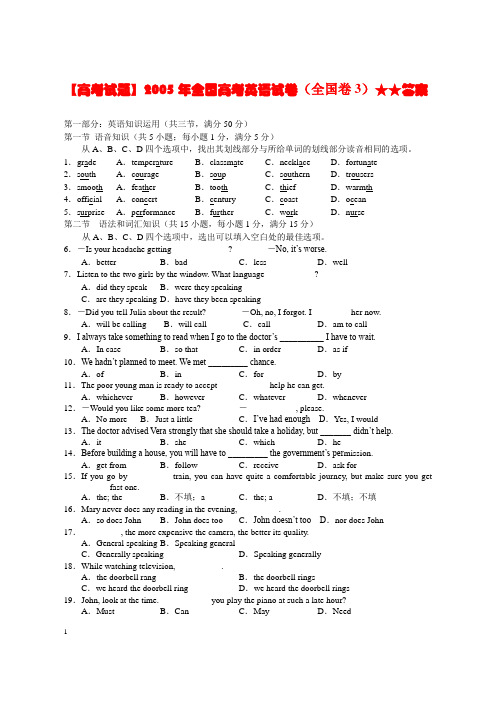
【高考试题】2005年全国高考英语试卷(全国卷3)★★答案第一部分:英语知识运用(共三节,满分50分)第一节语音知识(共5小题;每小题1分,满分5分)从A、B、C、D四个选项中,找出其划线部分与所给单词的划线部分读音相同的选项。
1.grade A.temperature B.classmate C.necklace D.fortunate2.south A.courage B.soup C.southern D.trousers3.smooth A.feather B.tooth C.thief D.warmth4.official A.concert B.century C.coast D.ocean5.surprise A.performance B.further C.work D.nurse第二节语法和词汇知识(共15小题,每小题1分,满分15分)从A、B、C、D四个选项中,选出可以填入空白处的最佳选项。
6.-Is your headache getting_____________? -No, it’s worse.A.better B.bad C.less D.well7.Listen to the two girls by the window. What language ___________?A.did they speak B.were they speakingC.are they speaking D.have they been speaking8.-Did you tell Julia about the result? -Oh, no, I forgot. I ________ her now.A.will be calling B.will call C.call D.am to call9.I always take something to read when I go to the doctor’s __________ I have to wait.A.In case B.so that C.in order D.as if10.We hadn’t planned to meet. We met _________ chance.A.of B.in C.for D.by11.The poor young man is ready to accept ___________ help he can get.A.whichever B.however C.whatever D.whenever12.-Would you like some more tea? -___________, please.A.No more B.Just a little C.I’ve had enough D.Yes, I would13.The doctor advised Vera strongly that she should take a holiday, but _______ didn’t help.A.it B.she C.which D.he14.Before building a house, you will have to _________ the government’s permission.A.get from B.follow C.receive D.ask for15.If you go by _________ train, you can have quite a comfortable journey, but make sure you get __________ fast one.A.the; the B.不填;a C.the; a D.不填;不填16.Mary never does any reading in the evening, _________.A.so does John B.John does too C.John doesn’t too D.nor does John17._________, the more expensive the camera, the better its quality.A.General speaking B.Speaking generalC.Generally speaking D.Speaking generally18.While watching television, __________.A.the doorbell rang B.the doorbell ringsC.we heard the doorbell ring D.we heard the doorbell rings19.John, look at the time. ___________ you play the piano at such a late hour?A.Must B.Can C.May D.Need120.“You can’t catch me!” Janet shouted, __________ away.A.run B.running C.to run D.ran第二节完形填空(共20小题;每小题1.5分,满分30分)阅读下面短文,从短文后所给各题的四个选项(A、B、C和D)中,选出可以填入空白处的最佳选项。
2006年全国各地19套高考英语书面表达试题及参考范文
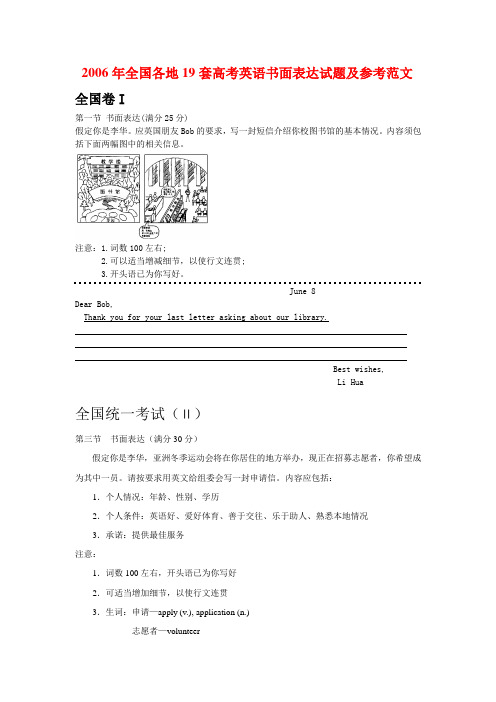
2006年全国各地19套高考英语书面表达试题及参考范文全国卷I第一节书面表达(满分25分)假定你是李华。
应英国朋友Bob的要求,写一封短信介绍你校图书馆的基本情况。
内容须包括下面两幅图中的相关信息。
注意:1.词数100左右;2.可以适当增减细节,以使行文连贯;3.开头语已为你写好。
June 8Dear Bob,Thank you for your last letter asking about our library.Best wishes,Li Hua全国统一考试(Ⅱ)第三节书面表达(满分30分)假定你是李华,亚洲冬季运动会将在你居住的地方举办,现正在招募志愿者,你希望成为其中一员。
请按要求用英文给组委会写一封申请信。
内容应包括:1.个人情况:年龄、性别、学历2.个人条件:英语好、爱好体育、善于交往、乐于助人、熟悉本地情况3.承诺:提供最佳服务注意:1.词数100左右,开头语已为你写好2.可适当增加细节,以使行文连贯3.生词:申请—apply (v.), application (n.)志愿者—volunteerDear Sir/Madam,My name is Li Hua. I would like to work as a volunteer for the Winter Asian Games.陕西卷第三节书面表达(满分30分)暑假即将来临,你班同学讨论了假期计划,提出了不同看法。
请根据提示写一篇有关讨论的英语短文,并谈谈你的看法。
注意:1.短文写在答题卡上的指定区域,词数80—120(不含已写好部分)。
2.短文必须包括表中所列要点,可根据内容分段表述。
3.可适当增加细节,以使行文连贯。
4.参考词汇:眼界—horizon(或view)The summer holiday is coming. Our class have had a discussion about what to do during the holiday.The summer holiday is coming. Our class have had a discussion about what to do during the holiday. Some are in favor of staying at home .They think it’s both convenient and comfortable. What’s more ,they can save money for other purposes .But they will lose the chance of getting to know that outside world.However ,others prefer to go out for traveling since it can increase their knowledge and broaden their horizons. But they will spend more money and meet some difficulties , while traveling.In my opinion, it would be much better stay at home ,for I can do what I like ,such as reading books ,watching TV, and helping my parents with the housework.湖北卷第二节 书面表达(满分25分) 受某英文报的委托,你最近对高中生的英语阅读兴趣做了一次调查。
英语高考试题解析全国卷三及英语复习测试试卷
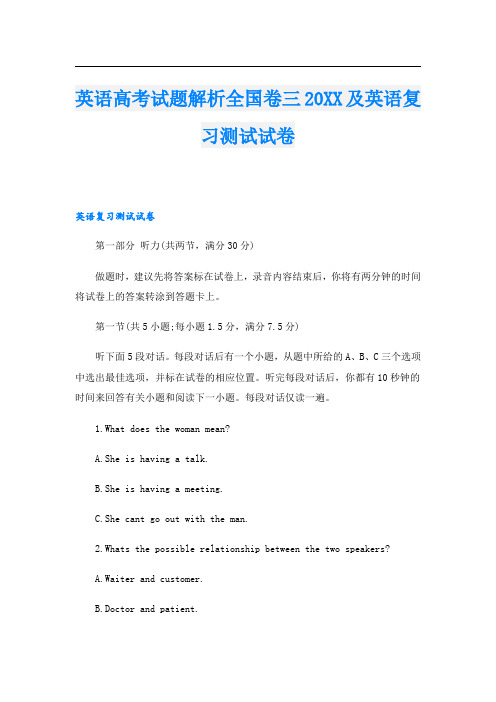
英语高考试题解析全国卷三20XX及英语复习测试试卷英语复习测试试卷第一部分听力(共两节,满分30分)做题时,建议先将答案标在试卷上,录音内容结束后,你将有两分钟的时间将试卷上的答案转涂到答题卡上。
第一节(共5小题;每小题1.5分,满分7.5分)听下面5段对话。
每段对话后有一个小题,从题中所给的A、B、C三个选项中选出最佳选项,并标在试卷的相应位置。
听完每段对话后,你都有10秒钟的时间来回答有关小题和阅读下一小题。
每段对话仅读一遍。
1.What does the woman mean?A.She is having a talk.B.She is having a meeting.C.She cant go out with the man.2.Whats the possible relationship between the two speakers?A.Waiter and customer.B.Doctor and patient.C.Teacher and student3.How much did the man pay?A.2.B.6.C.7.4.Where was Shelia born?A.In China.B.In Japan.C.In America.5.When will the plane take off?A.At 10:30.B.At 10:50.C.At 10:20.第二节(共15小题;每小题1.5分,满分22.5分)听下面5段对话或独白。
每段对话或独白后有几个小题。
从题中所给的A、B、C三个选项中选出最佳选项,并标在试卷的相应位置。
听每段对话或独白前,你将有时间阅读各个小题,每小题5秒钟;听完后,各小题给出5秒钟的作答时间。
每段对话或独白读两遍。
听下面一段对话,回答第6和第7两个小题。
6.What is the possible relationship between the two speakers?A.Teacher and student.B.Mother and son.C.Classmates.7.What will most probably happen next?A.Tony will throw the paper on the floor.B.Bill will put all his paper in the basket.C.Bill will go out to empty the basket.听下面一段对话,回答第8至第10三个小题。
2016年高考全国3卷英语试题及答案解析
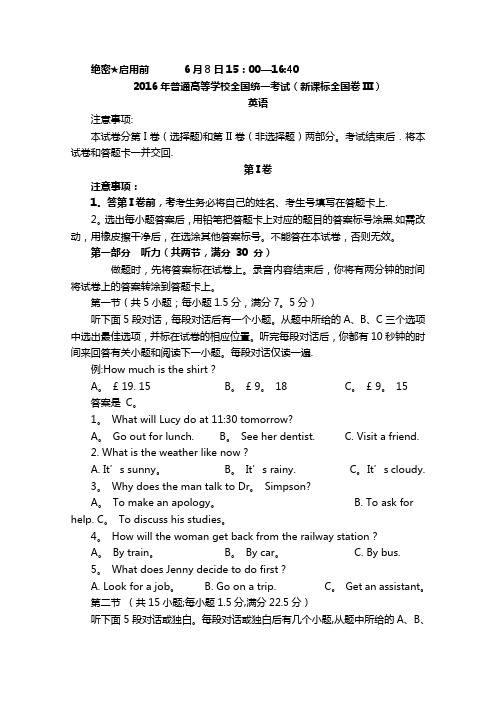
绝密★启用前6月8日15:00—16:402016年普通高等学校全国统一考试(新课标全国卷III)英语注意事项:本试卷分第I卷(选择题)和第II卷(非选择题)两部分。
考试结束后.将本试卷和答题卡一并交回.第I卷注意事项:1。
答第I卷前,考考生务必将自己的姓名、考生号填写在答题卡上.2。
选出每小题答案后,用铅笔把答题卡上对应的题目的答案标号涂黑.如需改动,用橡皮擦干净后,在选涂其他答案标号。
不能答在本试卷,否则无效。
第一部分听力(共两节,满分30 分)做题时,先将答案标在试卷上。
录音内容结束后,你将有两分钟的时间将试卷上的答案转涂到答题卡上。
第一节(共5小题;每小题1.5分,满分7。
5分)听下面5段对话,每段对话后有一个小题。
从题中所给的A、B、C三个选项中选出最佳选项,并标在试卷的相应位置。
听完每段对话后,你都有10秒钟的时间来回答有关小题和阅读下一小题。
每段对话仅读一遍.例:How much is the shirt?A。
£ 19. 15B。
£ 9。
18 C。
£ 9。
15答案是C。
1。
What will Lucy do at 11:30 tomorrow?A。
Go out for lunch. B。
See her dentist. C. Visit a friend.2. What is the weather like now?A. It’s sunny。
B。
It’s rainy.C。
It’s cloudy.3。
Why does the man talk to Dr。
Simpson?A。
To make an apology。
B. To ask for help. C。
To discuss his studies。
4。
How will the woman get back from the railway station?A。
By train。
B。
By car。
2017年-2019年普通高等学校招生全国统一考试英语试题(全国卷3,含答案)
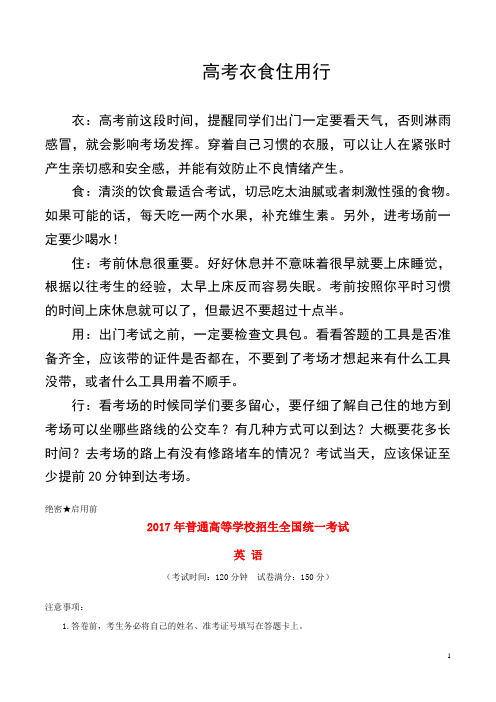
高考衣食住用行衣:高考前这段时间,提醒同学们出门一定要看天气,否则淋雨感冒,就会影响考场发挥。
穿着自己习惯的衣服,可以让人在紧张时产生亲切感和安全感,并能有效防止不良情绪产生。
食:清淡的饮食最适合考试,切忌吃太油腻或者刺激性强的食物。
如果可能的话,每天吃一两个水果,补充维生素。
另外,进考场前一定要少喝水!住:考前休息很重要。
好好休息并不意味着很早就要上床睡觉,根据以往考生的经验,太早上床反而容易失眠。
考前按照你平时习惯的时间上床休息就可以了,但最迟不要超过十点半。
用:出门考试之前,一定要检查文具包。
看看答题的工具是否准备齐全,应该带的证件是否都在,不要到了考场才想起来有什么工具没带,或者什么工具用着不顺手。
行:看考场的时候同学们要多留心,要仔细了解自己住的地方到考场可以坐哪些路线的公交车?有几种方式可以到达?大概要花多长时间?去考场的路上有没有修路堵车的情况?考试当天,应该保证至少提前20分钟到达考场。
绝密★启用前2017年普通高等学校招生全国统一考试英语(考试时间:120分钟试卷满分:150分)注意事项:1.答卷前,考生务必将自己的姓名、准考证号填写在答题卡上。
3.回答选择题时,选出每小题答案后,用铅笔把答题卡上对应题目的答案标号涂黑。
如需改动,用橡皮擦干净后,再选涂其他答案标号。
回答非选择题时,将答案写在答题卡上,写在本试卷上无效。
3.考试结束后,将本试卷和答题卡一并交回。
第一部分听力(共两节,满分30分)做题时,先将答案标在试卷上,录音结束后,你将有两分钟的时间将试卷上的答案转涂到答题卡上。
第一节(共5小题,每小题1.5分,满分7.5分)听下面5段对话,每段对话后有一个小题,从题中所给的A、B、C三个选项中选出最佳答案。
听完每段对话后,你都有10秒钟的时间来回答有关小题和阅读下一小题。
每段对话仅读一遍。
例:How much is the shirt?A.£ 19.15. B.£9.18. C.£9.15.答案是C。
2016年高考全国3卷英语试题及答案解析
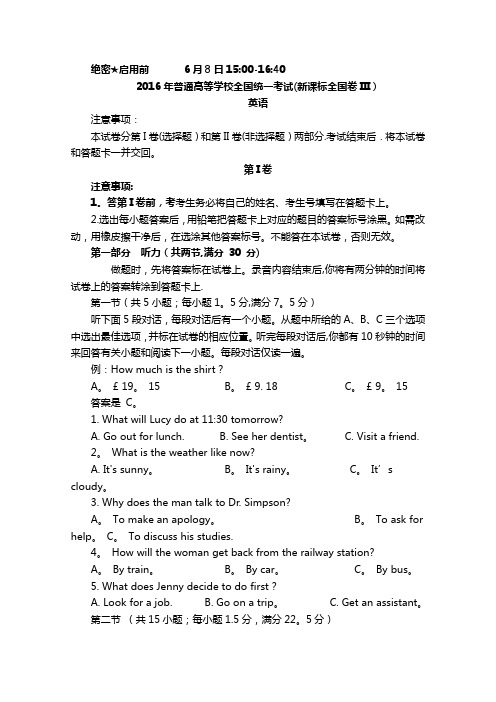
绝密★启用前6月8日15:00-16:402016年普通高等学校全国统一考试(新课标全国卷III)英语注意事项:本试卷分第I卷(选择题)和第II卷(非选择题)两部分.考试结束后.将本试卷和答题卡一并交回。
第I卷注意事项:1。
答第I卷前,考考生务必将自己的姓名、考生号填写在答题卡上。
2.选出每小题答案后,用铅笔把答题卡上对应的题目的答案标号涂黑。
如需改动,用橡皮擦干净后,在选涂其他答案标号。
不能答在本试卷,否则无效。
第一部分听力(共两节,满分30 分)做题时,先将答案标在试卷上。
录音内容结束后,你将有两分钟的时间将试卷上的答案转涂到答题卡上.第一节(共5小题;每小题1。
5分,满分7。
5分)听下面5段对话,每段对话后有一个小题。
从题中所给的A、B、C三个选项中选出最佳选项,并标在试卷的相应位置。
听完每段对话后,你都有10秒钟的时间来回答有关小题和阅读下一小题。
每段对话仅读一遍。
例:How much is the shirt?A。
£ 19。
15 B。
£ 9. 18C。
£ 9。
15答案是C。
1. What will Lucy do at 11:30 tomorrow?A. Go out for lunch.B. See her dentist。
C. Visit a friend.2。
What is the weather like now?A. It's sunny。
B。
It's rainy。
C。
It’s cloudy。
3. Why does the man talk to Dr. Simpson?A。
To make an apology。
B。
To ask for help。
C。
To discuss his studies.4。
How will the woman get back from the railway station?A。
By train。
B。
2016年高考英语全国卷3(含详细答案)
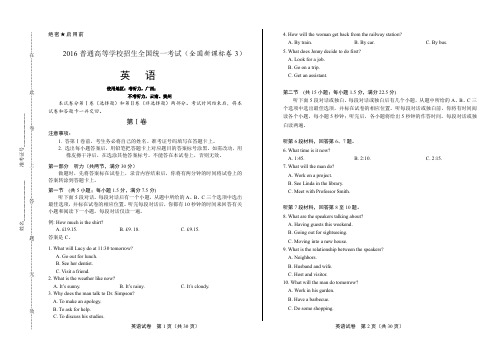
英语试卷 第1页(共30页)英语试卷 第2页(共30页)绝密★启用前 2016普通高等学校招生全国统一考试(全国新课标卷3)英语使用地区:考听力,广西;不考听力,云南、贵州本试卷分第Ⅰ卷(选择题)和第Ⅱ卷(非选择题)两部分。
考试时间结束后,将本试卷和答题卡一并交回。
第Ⅰ卷注意事项:1. 答第Ⅰ卷前,考生务必将自己的姓名、准考证号码填写在答题卡上。
2. 选出每小题答案后,用铅笔把答题卡上对应题目的答案标号涂黑。
如需改动,用橡皮擦干净后,在选涂其他答案标号。
不能答在本试卷上,否则无效。
第一部分 听力(共两节,满分30分)做题时,先将答案标在试卷上,录音内容结束后,你将有两分钟的时间将试卷上的答案转涂到答题卡上。
第一节 (共5小题;每小题1.5分,满分7.5分)听下面5段对话。
每段对话后有一个小题,从题中所给的A 、B 、C 三个选项中选出最佳选项,并标在试卷的相应位置。
听完每段对话后,你都有10秒钟的时间来回答有关小题和阅读下一小题。
每段对话仅读一遍。
例: How much is the shirt? A. £19.15. B. £9. 18. C. £9.15.答案是C 。
1. What will Lucy do at 11:30 tomorrow?A. Go out for lunch.B. See her dentist.C. Visit a friend.2. What is the weather like now? A. It’s sunny. B. It’s rainy.C. It’s cloudy.3. Why does the man talk to Dr. Simpson? A. To make an apology. B. To ask for help.C. To discuss his studies.4. How will the woman get back from the railway station? A. By train.B. By car.C. By bus.5. What does Jenny decide to do first? A. Look for a job. B. Go on a trip. C. Get an assistant.第二节 (共15小题;每小题1.5分,满分22.5分)听下面5段对话或独白。
- 1、下载文档前请自行甄别文档内容的完整性,平台不提供额外的编辑、内容补充、找答案等附加服务。
- 2、"仅部分预览"的文档,不可在线预览部分如存在完整性等问题,可反馈申请退款(可完整预览的文档不适用该条件!)。
- 3、如文档侵犯您的权益,请联系客服反馈,我们会尽快为您处理(人工客服工作时间:9:00-18:30)。
2006年普通高等学校招生全国统一考试III卷语音知识1.hearA. nearlyB. searchC. bearD. heart2.changeA. machineB. headacheC. techniqueD. research3.surpriseA. policeB. apologizeC. bridgeD. children4.safelyA. baseB. seasonC. AsiaD. usual5.museumA. subjectB. trueC. bulgeD. busy单项填空6.–Will you be able to finish your report today? –_______.A. I like itB. I hope soC. I’ll do soD. I’d love it7.We forgot to bring our tickets, but please let us enter, _______.A. do youB. can weC. will youD. shall we8.Your story is perfec t; I’ve never heard _______ before.A. the better oneB. the best oneC. a better oneD. a good one9.It was not until she got home _______ Jennifer realized she had lost her keys.A. whenB. thatC. whereD. before10.We hope that as many people as-possible _______ join us for the picnic tomorrow.A. needB. mustC. shouldD. can11.It is no _______ arguing with Bill because he will never change his mind.A. useB. helpC. timeD. way12.John, a friend of mine, who got married only last week, spent $3,000 more than he _______for the wedding.A. will planB. has plannedC. would planD. had planned13.We thought there were 35 students in the dining hall, _______, in fact, there were 40.A. whileB. whetherC. whatD. which14.–Did you take enough money with you? –No, I needed _______ I thought I would.A. not so much asB. as much asC. much more thanD. much less than15.Mary wanted to travel around the world all by herself, but her parents did not _______ her todo so.A. forbidB. allowC. followD. ask16.–What did your parents think about your decision?–They always let me do _______ I think I should.A. whenB. thatC. howD. what17.We often provide our children with toys, footballs or basketballs, _______ that all childrenlike these things.A. thinkingB. thinkC. to thinkD. thought18.There were a lot of people standing at the door and the small girl couldn’t get _______.A. betweenB. throughC. acrossD. beyond19.I know you don’t like _______ music very much. But what do you think of _______ music inthe film we saw yesterday?A. /; /B. the; theC. the; /D. /; the20.As you can see, the number of cars on roads _______ rising these days.A. we keepingB. keepC. keepsD. were keeping 完型填空The year I went away to college was a very difficult transition (过渡期) for me. 21 is probably true with many people. I got quite homesick and 22 thought about going home.Although the 23 time for many students is getting 24 from home, my mailbox was frequently 25 . One day when I went to the mailbox, there was a postcard 26 out at me. I sat down to read it, 27 a note from someone back home. 28 I became increasingly puzzled (困惑) as 29 postcard were like this: It was full news report about a woman named Mabel and her new born baby. I took the card back to my room and 30 about it.Several days later I 31 another postcard, this one 32 news about Maybelline, Mabel’s cousin. Soon after, another card arrived and then another, 33 full of different people. I began to 34 look forward to the next one, 35 to see what this author would come up with 36 . I was never 37 .Finally, the cards 38 coming, right about the time I had begun to feel 39 about college life. They had been such a happy distraction (调剂) that, I have 40 all the postcards and still bring them out to read whenever I need a life.21. A. If B. So C. As D. What22. A. often B. carefully C. seldom D. merely23. A. hard B. last C. busiest D. happiest24. A. visitors B. letters C. calls D. directions25. A. empty B. full C. closed D. open26. A. pouring B. reaching C. staring D. rolling27. A. describing B. considering C. enjoying D. expecting28. A. But B. Thus C. Also D. Even29. A. any B. no C. some D. such30. A. joked B. talked C. forgot D. cared31. A. mailed B. accepted C. wrote D. received32. A. delivering B. demanding C. discovering D. developing33. A. one B. each C. either D. both34. A. nearly B. possibly C. usually D. really35. A. promising B. surprised C. interested D. pretending36. A. below B. lately C. next D. behind37. A. frightened B. disappointed C. excited D. pleased38. A. continued B. stopped C. started D. avoided39. A. easy B. safe C. tired D. anxious40. A. lost B. collected C. torn D. saved阅读理解AMy friend, Emma Danicls, spent the summer of 1974 traveling in Israel. During her month-long stay in Jerusalem she often went to a café called chocolate soup. It was run by two men, of the whom-Alex-used to live in Montreal. One morning when Emma went in for coffee, while chatting with her new friend Alex, she mentioned that she had just finished the book she was reading and had nothing else to read. Alex said he had a wonderful book she might like, and that he’d be happy to lend it to her. As he lived just above the café, he quickly ran up to get it. The book he handed to Emma just minutes later was markings, a book by a former secretary-general of the United Nations (UN).Emma had never read it, nor had she ever bought a copy, but when she opened it up, she was floored to see her own name and address inside the cover, in her own handwriting (笔迹). It was in town visiting friends. They decided to exchange (交卷) addresses, but neither of them had any paper. The man opened up a book he was carrying in his backpack (背包) and asked Emma to write her name and address inside. When he returned to California, he left the book behind in Montreal, and his friend Alex kept it. When Alex later moved to Jerusalem, he took the book along.41.Alex lent Emma the book, Markings, _______.A. to show his friendliness to herB. to show his interest in readingC. to tell her about the importance of the UND. to let her write her name and addressinside42.How did Emma feel the moment she opened the book?A. PleasedB. SatisfiedC. WorriedD. Surprised43.We can learn from the text the California _______.A. met Emma at a concertB. invited Emma to a concertC. introduced Emma to his friendD. left Emma his backpack44.Who was supposed to be the first owner of the book?A. An official of the UNB. A coffee shop ownerC. A friend of the author’sD. Alex’s friend from CaliforniaBMay: Happenings from the PastMay 5, 1884Issac Murphy, son of a slave and perhaps the greatest horse rider in American history, rides Buchanan to win his first Kentucky Derby. He becomes the first rider ever to win the race three times.May 9, 1754Benjamin Franklin’s Pennsylvania gazette produces perhaps the first American political cartoon (漫画), showing a snake cut in pieces with the words “Join or Die” printed under the picture.May 11, 1934The first great dust storm of the Great Plains Dust Bowl, the result of years of drought (干旱), blows topsoil all the way to New York City and Washington, D.C.May 19, 1994Jacqueline Lee Bouvier Kennedy Onassis, former first lady and one of the most famous people of the 1960s died of cancer in New York City at the age of 64.May 24, 1844Samuel F.B Morse taps out the first message, “What hath God wrought,” over the experimental long-distance telegraph line which runs from Washington, D.C., to Baltimore, Md.45.We know from the text that Buchanan is _______.A. Isaac’s fatherB. a winning horseC. a slave taking care of horsesD. the first racing horse in Kentucky46.What is the title of the first American political cartoon?A. Join or DieB. Pennsylvania GazetteC. What Hath God WroughtD. Kentucky Derby47.In which year did the former first lady Jacqueline die?A. 1934B. 1960C. 1964D. 199448.Which of the following places has to do with the first telegram in history?A. Washing to, D.C.B. New York CityC. KentuckyD. PennsylvaniaCWhen I learned that my 71-year-old mother was playing Scrabble – a word game – against herself, I knew I had to do something. My husband suggested we give her a computer to play against. I wasn’t sure my mother was ready for it. After all, it had taken 15 years to persuade her to buy an electric cooker. Even so, we packed up our old computer and delivered it to my parents’ home. And so began my mother’s adventure in the world of computers.It also marked the beginning of an unusual teaching task for me. I’ve taught people of all ages, but I never thought I would be teaching my mother how to do anything she has been the one teaching me all my life; to cook and sew; to enjoy the good times and put up with the bad. Now it was my turn to give something back.It wasn’t easy at the beginning. There was so much to exp lain and to introduce. Slowly but surely, my mother caught on, making notes in a little notebook. After a few months of scrabble and other games, I decided it was time to introduce her to word processing (文字处理). This proved to be a bigger challenge (挑战) to her, so I gave her some homework. I asked her to write me a letter, using different letter types, colors and space.“Are you this demanding with your kindergarten pupils?” she asked.“No, of course not,” I said. “they already know how to use a computer.”My mother isn’t the only one experiencing a fast personal growth period. Thanks to the computer, my father has finally got over his phone allergy (过敏反映). For as long as I can remember, any time I called, my mother would answer. Dad and I have had more phone conversations in the last month than we’ve had in the past 20 years.49.What does the author do?A. She is a cook.B. She is a teacher.C. She is a housewife.D. She is a computer engineer.50.The author decided to give her mother a computer _______.A. to let her have more chances to write lettersB. to support her in doing her homeworkC. to help her through the bad timesD. to make her life more enjoyable51.The author asked her mother to write her a letter _______.A. because he mother had stopped using the telephoneB. because she wanted to keep in touch with her motherC. so that her mother could practice what she had learnedD. so that her mother could be free from housework52.After the computer was brought home, the author’s father _______.A. lost interest in cookingB. took more phone callsC. played more gamesD. began to use itDWhen asked to point out one or two things that are most important to themselves, many put friends ahead of homes, jobs, cloth and cars.A true friendship carries-a-long history of experience that determines who we are and keeps us connected. It is a treasure we should protect. Unfortunately, the better friends you are, the more probably you’ll have disagreements. And the result can be what you don’t want an end to the relationship.The good news is that most troubled friendships can be mended First, don’t’ let your pride get in your way. Most of us can forgive each other when differences are brought out in the open. Second, apologize when you’re wrong –even if you’ve been wronged. Over the course of a friendship, even the best people make mistakes. Sometimes, it may be best if the wronged person takes the lead and apologizes. When you apologize, give your friend a chance to admit that he has been wrong. Third, see things from your friend’s point of view (观点). And finally, accept that friendships change as our needs and lifestyle (生活方式) change. Making friends can sometimes seem easy. The hard part is keeping the connections strong during the natural ups and downs that have an effect on all relationships. My suggestion: Consider friendship an honor and a gift, and worth the effort to treasure and nurture (培养).53.What would be the best title for the text?A. Easy Ways to Make FriendsB. Ups and Downs in FriendshipC. How to Mend a Troubled FriendshipD. How to Take the Lead in MakingFriends54.The “wronged person” underlined in the text refers to a person _______.A. who has been mistaken for anotherB. who has been blamed unfairlyC. who has treated friends badlyD. who has admitted his mistakes55.According to the text a friendship can last long only if _______.A. we have much in commonB. we know our friends’ mistakesC. we treat our disagreements wiselyD. we have know one another for long56.What should we do if we follow the author’s second suggestion?A. Stick to our own prints of viewB. Avoid making mistakesC. Make an apology firstD. Change our lifestylesE“Who made you T-sh irt?” A Geo letdown University students raised that question. Piertra Rivoli, a professor of business, wanted to find the answer. A few weeks later, she bought a T-shirt and began to follow its path form Texas cotton, rim to Chinese factory to charity bin (慈善捐赠箱). The result is an interesting new book, The tran’s of a T-shirt in the Global Economy (经济).Following a T-shirt around the world in a way to make her point more interesting, but it also frees Rivoli from the usual arguments over global trade. She goes wherever the T-shirt goes, and there are surprises around every corner. In China, Rivoli shows why a clothing factory, even with its poor conditions, means a step towards a better care for the people who word there. In the colorful used-clohting market s of Tanzania, she realizes that, “it is only in this final stage of life that the T-shirt will meet a real market,” where the price of a shirt changes by the hour and is different by its size and even color, Rivoli’s book is full of me able people and sce nes, like the noise, the bad air and the “muddy sweet smell (泥土香味) of the cotton,” she says. “Here in the factory, Shanghai smells like shallot water Texas.”Rivoli is at her best when making those sorts of unexpected connections. She even finds one between the free traders and those who are against globalization. The changes opened up by trade are vase, she argues, but free markets need the correcting force of politics to keep them in check. True economic progress needs them both.57.What do we learn about Professor Rivoli?A. She used to word on cotton farm.B. She wrote a book about world trade.C. She wants to give up her teaching job.D. She wears a T-shirt wherever she goes.58.By saying T-shirt “meet a real market”, Rivoli means in Tanzania _______.A. cheaper T-shirts are neededB. used T-shirts are hard to sellC. prices of T-shirts rise and fall frequentlyD. prices of T-shirts are usually reasonable59.What does the word “them” underlined in the last paragraph refer to?A. Free markets.B. Price changes.C. Unexpected connections.D. Chances opened up by trade.60.What would be the best title for the text?A. What T-shirts Can Do to Help Cotton FarmsB. How T-shirts Are Made in ShanghaiC. How T-shirts Are Sold in TanzaniaD. What T-shirts Can Teach Us注意: I卷上61-80为空题(无此序号), 考生必须将第“81-85”序号题答在<答题卡>相对应...位置上..., 否则不得分.补全对话What do you think I ought to see first in London? I’m told one ought to see the British Museum. Do you think I shall have time for that?–81 But if I were you, I should leave that for some other day. You could spend a whole day there. It’s much too big to be seen in an hour or so.–I suppose it is. 82–That’s not a bad idea. You could spend a couple of hours there comfortably, or even a whole afternoon, watching the wild animals and all those bride. You could have tea there too.–I’ll do that, then. How do I get there?–83 Where are we now? Oh, there’s that big building. I think your best way from here is to take Baker Street.–84–Oh, no, a quarter of an hour or so, but, i f you’re in a hurry, why not take a taxi?–I think I will 85 Taxi!A. Let me see.B. Well, you might.C. What time is it now?D. Is it much of a walk?E. Ah, here’s one coming.F. What about going to the Zoo?G. Must I stay in London for long?第二卷单词拼写66. I’m very hungry – I _______ (错过) lunch. 66. _______67. Jack took a deep _______ (呼吸) and then dived into the water. 67. _______68. I’ve got an _______ (普通) sort of car, nothing special. 68. _______69. I want to thank everyone who has _______ (鼓励) and supported me. 69. _______70. Jenny spends hours in front of the _______ (镜子)! 70. _______71. It is _______ (稍微) colder today than it was yesterday. 71. _______72. The story is written by an _______ (澳大利亚) engineer. 72. _______73. Tom was _______ (羞愧) of having lied to his parents. 73. _______74. _______ (一月) is the first month of the year. 74. _______75. Can you _______ (想象) standing up there and giving a speech? 75. _______短文改错An American and a Frenchman decided to cross the seabetween France and England in the balloon in 1784. High 76. _______over the water, they discover a hole in the balloon. The 77. _______hole became bigger and bigger. The air keeps the 78. _______ balloon up was escaping quickly and the balloon was 79. _______ coming up. The two men threw all their equipment into 80. _______the water to make the balloon light. It started to rise 81. _______ higher again. So it was still too close to the water. 82. _______ finally, the men threw away most of his clothes to 83. _______ save themselves. The crowd waiting for to greet them in 84. _______ England was very surprised see this when the balloon 85. _______ landed in front of them.书面表达假定你是李华, 亚洲冬季运动会将在你居住的地方举办, 现在正在招募志愿者, 你希望成为其中一员。
